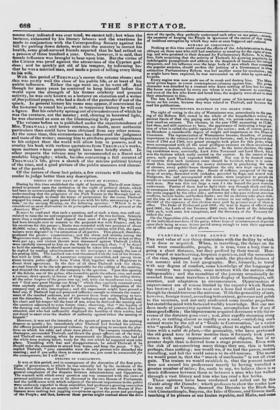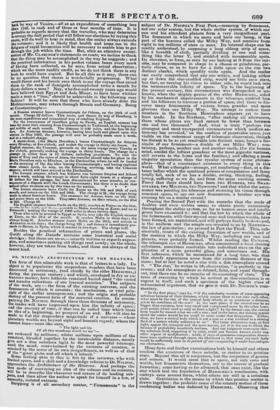CLARIDGE'S GUIDE ALONG THE DANUBE.
THE real value of any thing diminishes with the facility by which it is done or acquired. When, in travelling, the delays on the road were considerable, people, it is true, were a long time in going a short distance, but they profited by their travel. How- ever stupid or unobserving, frequent repetition, and the necessities of the case, impressed upon their minds the physical features of the country and its local geography. But, formerly, to travel with any degree of comfort, some knowledge of the language of the country was requisite, some mixture with the natives often indispensable ; and the casualties of the journey occasionally de- mended from most travellers a little display of forethought, self- exertion, and adaptation to circumstances. Opportunities of improvement are of course limited by the capacity which Nature has bestowed ; and he who went out a born foul would so return, though he should traverse the universe. With the generality of men, however, foreign travel, according to its extent, gave ease and polish to the manners, and not only eradicated some insular prejudices, but stored the mind with facts and worldly knowledge. But our ma dern mode of journeying against time, accomplishes few if any of these good effects ; the improvement acquired decreases with the in- crease of the distance gone over ; and, after rapidly steaming along a river, or rattling almost as rapidly over a road,—satisfying one's animal wants by the aid of a "Guido to Conversation," or a waiter who "speaks English," and rambling about to sights and exhibi- tions with a valet de place,—tho generality, who have performed the old grand tour in fewer months than it formerly took years, return with many impressions of external objects, but of no greater depth than is derived from a stage procession. Even with the risk of misconceiving many things they see, this is better, perhaps, than nothing; nor would we, if we bad the power, restrict travelling, and bid the world return to its old courses. The moral we would point is, that the " march of mechanics" is not all clear gain. The truism we would establish is, that the present tourist does not exceed his predecessor merely by having travelled a greater number of miles; for, south to say, we believe there is as much difference between them as between a man who has walked through a vast library and him who has read a few books. These opinions have beets confirmed and called out by this Guide along the Danube; which professes to show the reader bow ho may call at Vienna, descend the Danube to the Black Sea, visit Constantinople, Smyrna, the Isles of Greece, and Greece itself, touching if be pleases at our Ionian republic, and Malta, and come back by way of Venice,—all at an expenditure of something less than 1201. in cash and of three or four months of time. It is probable as regards money that the traveller, who may determine to occupy' the dull period that will follow our elections by trying this route, will do well to bear in mind, that the outlay always exceeds the estimate; and it is likely that health and some use in the fatigues of rapid locomotion will be necessary to enable him to get through the job within the time. nut, after an attentive exami- nation of Mr. CLARIDGE'S statements en route, we incline to think that the thing may be accomplished in the way he suggests ; and the practical information in his pocket volume bears every mark of having, been collected, as he says, from actual observation ; which we the more readily credit, as we do not think there is any book he could have copied. But be all this as it may, there can he no question that steam is wonderfully progressing. What' would Jason and his heroic race think to see the voyage that raised them to the rank of demigods accomplished twice a month for thirty dollars a man ? Nay, who five-and-twenty years ago would have believed that Egypt and Asia Minor, to have been whither made a man a "lion," should be achievable in the following easy fashion? It will be seen that those who have already done the Mediterranean, may return through Russia and Germany. Being at Constantinople— A Russian steamer leaves Constantinople for Odessa, on the 20th of each month. Charge 22 dollars. This route, and thence by way of Hamburg, is the most expeditious and economical way of reaching England. For the conveyance of travellers going to Persia, an English steamer has been for some time running from Constantinople to Trebizond, at the beginning and middle of each month. The distance is 530 miles, and the fare 30 dol- lars. An Austrian steamer, however, having been built and placed upon this station in May 1837, the passage will now be probably made once a week, end at a reduced charge. A steam-boat, (the Maria Dorothea,) leaves Constantinople for Smyrna every Monday, at five o'clock, and makes the voyage in thirty-six hours. An English steamer, the Crescent, proceeds on the same voyage every Tuesday at bra o'clock, generally making the voyage in thirty hours. The charge for a passage in either boat is 13 dollars, including provisions. To visit the plains of Troy and the ruins of Amos, the traveller should take his place in the lihria Dorothea only to Mitylene, in the Dardanelles, where he will be landed on the morning of the day after leaving Constantinople; and having explored these classic spots, be may, on the following morning, take the Crescent steamer, which will have arrived in the Dardanelles.
The Levant steamer, which has hitherto run between Smyrna and Athena twice a week, making the voyage in about forty-eight hours, at a charge of 90 dollars for the passage, has been discontinued for some months, in con- sequence of a dispute with the Greek Government; but there is no doubt that
several other steamers are by this time on the station. • • •
The Ionian steamers leave Corfu for Zante on the 8th and '26th of each month, acid return on the 12th and 29th. The charge is 2/., the voyage being made in about fourteen hours. The steamers for Ancona leave on the 16th, and arrive there on the 18th. They leave Ancona, on their return, on the 21st as 22d. Charge 6/. The English steamer leaves Corfu on the 29th, touches at Patras on the 31st, w 1..1:" ....a povoetts to Malta, touching at Zante, and on to Falmouth ; making the voyage of 1900 miles in about twenty days. Those who wish to proceed to Egypt or Syria, may take the English steamer at Zante, on the 31st of the month. It leaches Malta in three days; the charge tieing 81. Another steamer ,leaves Malta on the 20th, and arrives at Alexandria in six days; the charge 1.iing 121. ; and thence it immediately pro- ceeds to Beroot, in Syria, which it reaches in two days. The charge is 6/.
Besides the practical information of prices and places, the Guide along the Danube contains some historical and social sketelies : but these are so-so,—smartly written as regards expres- sion, and sometimes making old things read newly; on the whole, however, they are taken front books, and those not always of the truest kind.



























 Previous page
Previous page